On May 29…
“In all history there is no war which was not hatched by the governments, the governments alone, independent of the interests of the people, to whom war is always pernicious even when successful.”
~Leo Tolstoy

1780 – British Colonel Banastre Tarleton had been given the mission to destroy any colonial resistance in South Carolina … and on this date, he used it to the extreme.
At the Battle of Waxhaws, six miles south of the North Carolina border, a cavalry charge by Tarleton’s men broke the 350 Patriots under Colonel Abraham Buford. Tarleton and his troops weren’t satisfied with the victory.
His men used their sabres on the beleaguered Americans, including men who were kneeling with their hands up in surrender. The defeat at Waxhaws cost Buford 113 killed and 150 severely wounded. A large group of the American dead were buried in a mass grave (shown above).

1866 – Winfield Scott, who served as Commanding General of the United States Army for 20 years, died at the United States Military Academy at West Point, New York. He was 79.
Over the course of his 53-year career, “Old Fuss and Feathers” commanded forces in the War of 1812, the Black Hawk War, the Mexican–American War, and the Second Seminole War.
He was the army’s senior officer at the start of the Civil War, and conceived the Union strategy known as the “Anaconda Plan” (which emphasized a Union blockade of the Southern ports, and called for an advance down the Mississippi River to cut the South in two), which was used to defeat the Confederacy.
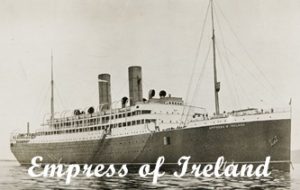
1914 – Heavy fog and a horrible series of blunders caused a collision of boats on the St. Lawrence River in Canada. It was one of the worst maritime disasters in history.
The Empress of Ireland had left Quebec City on May 28 with 1,057 passengers and 420 crew members on board. On this date – at 2:00 a.m. – the Empress was near Father Point on the St. Lawrence River when thick fog rolled in. A Norwegian coal freighter, the Storstad, was approaching as visibility was reduced to nearly nothing.
Although each ship was aware of the other, the Storstad failed to follow standard procedures for fog conditions, which call for stopping when visibility is drastically reduced. The Storstad only slowed, while the Empress came to a complete stop.
The Norwegian freighter hit the Empress mid-ship and sliced through its hull. Captain Thomas Anderson of the Storstad made matters even worse by failing to reverse engines after the crash. He proceeded directly ahead, crushing many people on board and turning the Empress over onto its side.
The Empress sank in just 14 minutes. Of the 1,057 passengers and 420 crew members on board, only 217 passengers and 248 crew members survived the collision.

1942 – Bing Crosby recorded White Christmas. The song spent eleven weeks on top of the charts in 1942, and returned to the #1 spot again during the holiday seasons of 1945 and 1946, making it the only single in history with three separate runs at the top of the U.S. charts.

1946 – Martin Gottfried Weiss, commandant of Neuengamme concentration camp and later the commandant of Majdanek concentration camp, and commandant of Dachau concentration camp in 1945 at the time of his arrest, was executed by hanging at Landsberg prison after being found guilty of “violating the laws and usages of war”.
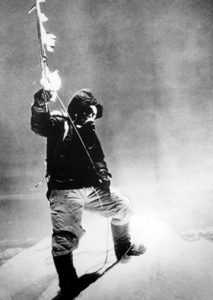
1953 – Edmund Hillary of New Zealand and Tenzing Norgay, a Sherpa of Nepal, became the first explorers to reach the summit of Mount Everest, which at 29,035 feet above sea level is the highest point on earth.
Hillary took a photograph (shown above) of Norgay using an ice axe as a standard for the British Flag on the summit of Mt. Everest. Ironically Tensing would be required to use this same axe to save Hillary’s life during a mishap in a crevasse field during the parties decent from the summit.
Queen Elizabeth II learned of the achievement on June 1, the eve of her coronation. The next day, the news broke around the world. Later that year, Hillary and Colonel John Hunt – commander of the British expedition – were knighted by the queen. Norgay, because he was not a citizen of a Commonwealth nation, received the British Empire Medal.

1995 – Margaret Chase Smith, the first woman to serve in both houses of the United States Congress, and the first woman to represent Maine in either role, passed away at the age of 97.
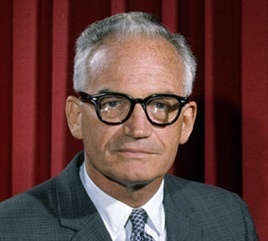
1998 – Barry Goldwater, five-term United States Senator from Arizona and the Republican Party’s nominee for president in the 1964 election, died from complications of a stroke. He was 89 and in the early stages of Alzheimer’s disease.

2004 – Archibald Cox, special prosecutor during the Watergate scandal before being fired by President Richard Nixon, died of natural causes at the age of 92.
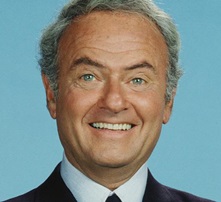
2008 – Actor/comedian Harvey Korman (best remembered for his performances on The Carol Burnett Show and for playing the role of Hedley Lamarr in Blazing Saddles) died at the age of 81 as the result of complications from a ruptured abdominal aortic aneurysm.

2009 – Record producer Phil Spector was formally sentenced to 19 years to life in prison for the 2003 second-degree murder of actress Lana Clarkson. He won’t be eligible for parole until age 88, in 2028.
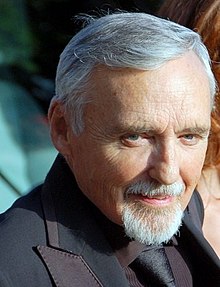
2010 – Actor Dennis Hopper (Rebel Without A Cause, Giant, Easy Rider, Apocalypse Now, Blue Velvet, Speed and Hoosiers) died of prostate cancer at the age of 74.

2017 – Manuel Noriega, the de facto ruler of Panama from 1983 to 1989 before he was forcibly removed when American troops invaded, following an operation after suffering a brain hemorrhage. He was 83.
Compiled by Ray Lemire ©2018 RayLemire.com. / Streamingoldies.com. All Rights Reserved.